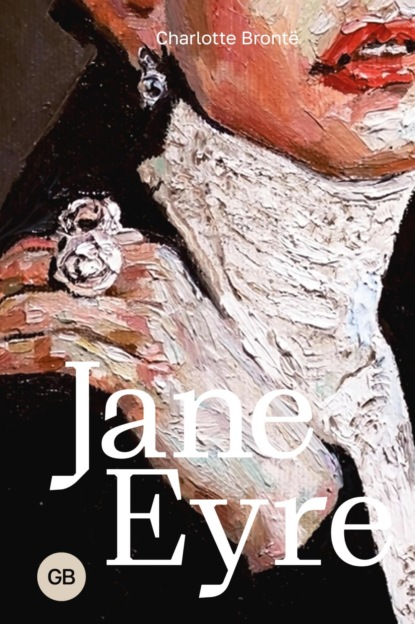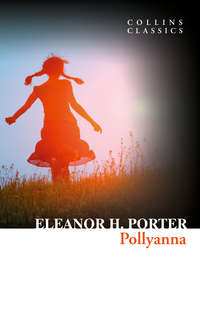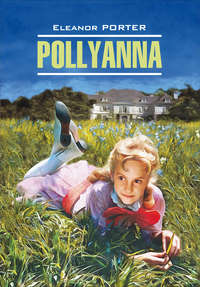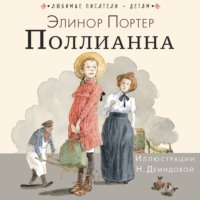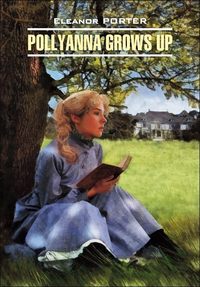
Полная версия
Pollyanna: The First Glad Book. Pollyanna Grows Up: The Second Glad Book / Поллианна. Поллианна вырастает
“I–I don’t know,” answered Nancy in a half-stifled voice.
“I do. We didn’t have any pictures. They don’t come in the barrels much, you know. There did two come once, though. But one was so good father sold it to get money to buy me some shoes with; and the other was so bad it fell to pieces just as soon as we hung it up. Glass-it broke, you know. And I cried. But I’m glad now we didn’t have any of those nice things, ‘cause I shall like Aunt Polly’s all the better-not being used to ‘em, you see. Just as it is when the PRETTY hair-ribbons come in the barrels after a lot of faded-out brown ones. My! but isn’t this a perfectly beautiful house?” she broke off fervently, as they turned into the wide driveway.
It was when Timothy was unloading the trunk that Nancy found an opportunity to mutter low in his ear:
“Don’t you never say nothin’ ter me again about leavin’, Timothy Durgin. You couldn’t HIRE me ter leave!”
“Leave! I should say not,” grinned the youth.
“You couldn’t drag me away. It’ll be more fun here now, with that kid ‘round, than movin’-picture shows, every day!”
“Fun! – fun!” repeated Nancy, indignantly, “I guess it’ll be somethin’ more than fun for that blessed child-when them two tries ter live tergether; and I guess she’ll be a-needin’ some rock ter fly to for refuge. Well, I’m a-goin’ ter be that rock, Timothy; I am, I am!” she vowed, as she turned and led Pollyanna up the broad steps.
Chapter IV
The little attic room
Miss Polly Harrington did not rise to meet her niece. She looked up from her book, it is true, as Nancy and the little girl appeared in the sitting-room doorway, and she held out a hand with “duty” written large on every coldly extended finger.
“How do you do, Pollyanna? I-” She had no chance to say more. Pollyanna, had fairly flown across the room and flung herself into her aunt’s scandalized, unyielding lap.
“Oh, Aunt Polly, Aunt Polly, I don’t know how to be glad enough that you let me come to live with you,” she was sobbing. “You don’t know how perfectly lovely it is to have you and Nancy and all this after you’ve had just the Ladies’ Aid!”
“Very likely-though I’ve not had the pleasure of the Ladies’ Aid’s acquaintance,” rejoined Miss Polly, stiffly, trying to unclasp the small, clinging fingers, and turning frowning eyes on Nancy in the doorway. “Nancy, that will do. You may go. Pollyanna, be good enough, please, to stand erect in a proper manner. I don’t know yet what you look like.”
Pollyanna drew back at once, laughing a little hysterically.
“No, I suppose you don’t; but you see I’m not very much to look at, anyway, on account of the freckles. Oh, and I ought to explain about the red gingham and the black velvet basque with white spots on the elbows. I told Nancy how father said-”
“Yes; well, never mind now what your father said,” interrupted Miss Polly, crisply. “You had a trunk, I presume?”
“Oh, yes, indeed, Aunt Polly. I’ve got a beautiful trunk that the Ladies’ Aid gave me. I haven’t got so very much in it-of my own, I mean. The barrels haven’t had many clothes for little girls in them lately; but there were all father’s books, and Mrs. White said she thought I ought to have those. You see, father-”
“Pollyanna,” interrupted her aunt again, sharply, “there is one thing that might just as well be understood right away at once; and that is, I do not care to have you keep talking of your father to me.”
The little girl drew in her breath tremulously.
“Why, Aunt Polly, you-you mean-” She hesitated, and her aunt filled the pause.
“We will go upstairs to your room. Your trunk is already there, I presume. I told Timothy to take it up-if you had one. You may follow me, Pollyanna.”
Without speaking, Pollyanna turned and followed her aunt from the room. Her eyes were brimming with tears, but her chin was bravely high.
“After all, I–I reckon I’m glad she doesn’t want me to talk about father,” Pollyanna was thinking. “It’ll be easier, maybe-if I don’t talk about him. Probably, anyhow, that is why she told me not to talk about him.” And Pollyanna, convinced anew of her aunt’s “kindness,” blinked off the tears and looked eagerly about her.
She was on the stairway now. Just ahead, her aunt’s black silk skirt rustled luxuriously. Behind her an open door allowed a glimpse of soft-tinted rugs and satin-covered chairs. Beneath her feet a marvellous carpet was like green moss to the tread. On every side the gilt of picture frames or the glint of sunlight through the filmy mesh of lace curtains flashed in her eyes.
“Oh, Aunt Polly, Aunt Polly,” breathed the little girl, rapturously; “what a perfectly lovely, lovely house! How awfully glad you must be you’re so rich!”
“PollyANNA!” ejaculated her aunt, turning sharply about as she reached the head of the stairs. “I’m surprised at you-making a speech like that to me!”
“Why, Aunt Polly, AREN’T you?” queried Pollyanna, in frank wonder.
“Certainly not, Pollyanna. I hope I could not so far forget myself as to be sinfully proud of any gift the Lord has seen fit to bestow upon me,” declared the lady; “certainly not, of RICHES!”
Miss Polly turned and walked down the hall toward the attic stairway door. She was glad, now, that she had put the child in the attic room. Her idea at first had been to get her niece as far away as possible from herself, and at the same time place her where her childish heedlessness would not destroy valuable furnishings. Now-with this evident strain of vanity showing thus early-it was all the more fortunate that the room planned for her was plain and sensible, thought Miss Polly.
Eagerly Pollyanna’s small feet pattered behind her aunt. Still more eagerly her big blue eyes tried to look in all directions at once, that no thing of beauty or interest in this wonderful house might be passed unseen. Most eagerly of all her mind turned to the wondrously exciting problem about to be solved: behind which of all these fascinating doors was waiting now her room-the dear, beautiful room full of curtains, rugs, and pictures, that was to be her very own? Then, abruptly, her aunt opened a door and ascended another stairway.
There was little to be seen here. A bare wall rose on either side. At the top of the stairs, wide reaches of shadowy space led to far corners where the roof came almost down to the floor, and where were stacked innumerable trunks and boxes. It was hot and stifling, too. Unconsciously Pollyanna lifted her head higher-it seemed so hard to breathe. Then she saw that her aunt had thrown open a door at the right.
“There, Pollyanna, here is your room, and your trunk is here, I see. Have you your key?”
Pollyanna nodded dumbly. Her eyes were a little wide and frightened.
Her aunt frowned.
“When I ask a question, Pollyanna, I prefer that you should answer aloud not merely with your head.”
“Yes, Aunt Polly.”
“Thank you; that is better. I believe you have everything that you need here,” she added, glancing at the well-filled towel rack and water pitcher. “I will send Nancy up to help you unpack. Supper is at six o’clock,” she finished, as she left the room and swept downstairs.
For a moment after she had gone Pollyanna stood quite still, looking after her. Then she turned her wide eyes to the bare wall, the bare floor, the bare windows. She turned them last to the little trunk that had stood not so long before in her own little room in the faraway Western home. The next moment she stumbled blindly toward it and fell on her knees at its side, covering her face with her hands.
Nancy found her there when she came up a few minutes later.
“There, there, you poor lamb,” she crooned, dropping to the floor and drawing the little girl into her arms. “I was just a-fearin! I’d find you like this, like this.”
Pollyanna shook her head.
“But I’m bad and wicked, Nancy-awful wicked,” she sobbed. “I just can’t make myself understand that God and the angels needed my father more than I did.”
“No more they did, neither,” declared Nancy, stoutly.
“Oh-h! – NANCY!” The burning horror in Pollyanna’s eyes dried the tears.
Nancy gave a shamefaced smile and rubbed her own eyes vigorously.
“There, there, child, I didn’t mean it, of course,” she cried briskly. “Come, let’s have your key and we’ll get inside this trunk and take out your dresses in no time, no time.”
Somewhat tearfully Pollyanna produced the key.
“There aren’t very many there, anyway,” she faltered.
“Then they’re all the sooner unpacked,” declared Nancy.
Pollyanna gave a sudden radiant smile.
“That’s so! I can be glad of that, can’t I?” she cried.
Nancy stared.
“Why, of-course,” she answered a little uncertainly.
Nancy’s capable hands made short work of unpacking the books, the patched undergarments, and the few pitifully unattractive dresses. Pollyanna, smiling bravely now, flew about, hanging the dresses in the closet, stacking the books on the table, and putting away the undergarments in the bureau drawers.
“I’m sure it-it’s going to be a very nice room. Don’t you think so?” she stammered, after a while.
There was no answer. Nancy was very busy, apparently, with her head in the trunk. Pollyanna, standing at the bureau, gazed a little wistfully at the bare wall above.
“And I can be glad there isn’t any looking-glass here, too, ‘cause where there ISN’T any glass I can’t see my freckles.”
Nancy made a sudden queer little sound with her mouth-but when Pollyanna turned, her head was in the trunk again. At one of the windows, a few minutes later, Pollyanna gave a glad cry and clapped her hands joyously.
“Oh, Nancy, I hadn’t seen this before,” she breathed. “Look-’way off there, with those trees and the houses and that lovely church spire, and the river shining just like silver. Why, Nancy, there doesn’t anybody need any pictures with that to look at. Oh, I’m so glad now she let me have this room!”
To Pollyanna’s surprise and dismay, Nancy burst into tears. Pollyanna hurriedly crossed to her side.
“Why, Nancy, Nancy-what is it?” she cried; then, fearfully: “This wasn’t-YOUR room, was it?”
“My room!” stormed Nancy, hotly, choking back the tears. “If you ain’t a little angel straight from Heaven, and if some folks don’t eat dirt before-Oh, land! there’s her bell!” After which amazing speech, Nancy sprang to her feet, dashed out of the room, and went clattering down the stairs.
Left alone, Pollyanna went back to her “picture,” as she mentally designated the beautiful view from the window. After a time she touched the sash tentatively. It seemed as if no longer could she endure the stifling heat. To her joy the sash moved under her fingers. The next moment the window was wide open, and Pollyanna was leaning far out, drinking in the fresh, sweet air.
She ran then to the other window. That, too, soon flew up under her eager hands. A big fly swept past her nose, and buzzed noisily about the room. Then another came, and another; but Pollyanna paid no heed. Pollyanna had made a wonderful discovery-against this window a huge tree flung great branches. To Pollyanna they looked like arms outstretched, inviting her. Suddenly she laughed aloud.
“I believe I can do it,” she chuckled. The next moment she had climbed nimbly to the window ledge. From there it was an easy matter to step to the nearest tree-branch. Then, clinging like a monkey, she swung herself from limb to limb until the lowest branch was reached. The drop to the ground was-even for Pollyanna, who was used to climbing trees-a little fearsome. She took it, however, with bated breath, swinging from her strong little arms, and landing on all fours in the soft grass. Then she picked herself up and looked eagerly about her.
She was at the back of the house. Before her lay a garden in which a bent old man was working. Beyond the garden a little path through an open field led up a steep hill, at the top of which a lone pine tree stood on guard beside the huge rock. To Pollyanna, at the moment, there seemed to be just one place in the world worth being in-the top of that big rock.
With a run and a skilful turn, Pollyanna skipped by the bent old man, threaded her way between the orderly rows of green growing things, and-a little out of breath-reached the path that ran through the open field. Then, determinedly, she began to climb. Already, however, she was thinking what a long, long way off that rock must be, when back at the window it had looked so near!
Fifteen minutes later the great clock in the hallway of the Harrington homestead struck six. At precisely the last stroke Nancy sounded the bell for supper.
One, two, three minutes passed. Miss Polly frowned and tapped the floor with her slipper. A little jerkily she rose to her feet, went into the hall, and looked upstairs, plainly impatient. For a minute she listened intently; then she turned and swept into the dining room.
“Nancy,” she said with decision, as soon as the little serving-maid appeared; “my niece is late. No, you need not call her,” she added severely, as Nancy made a move toward the hall door. “I told her what time supper was, and now she will have to suffer the consequences. She may as well begin at once to learn to be punctual. When she comes down she may have bread and milk in the kitchen.”
“Yes, ma’am.” It was well, perhaps, that Miss Polly did not happen to be looking at Nancy’s face just then.
At the earliest possible moment after supper, Nancy crept up the back stairs and thence to the attic room.
“Bread and milk, indeed! – and when the poor lamb hain’t only just cried herself to sleep,” she was muttering fiercely, as she softly pushed open the door. The next moment she gave a frightened cry. “Where are you? Where’ve you gone? Where HAVE you gone?” she panted, looking in the closet, under the bed, and even in the trunk and down the water pitcher. Then she flew downstairs and out to Old Tom in the garden.
“Mr. Tom, Mr. Tom, that blessed child’s gone,” she wailed. “She’s vanished right up into Heaven where she come from, poor lamb-and me told ter give her bread and milk in the kitchen-her what’s eatin’ angel food this minute, I’ll warrant, I’ll warrant!”
The old man straightened up.
“Gone? Heaven?” he repeated stupidly, unconsciously sweeping the brilliant sunset sky with his gaze. He stopped, stared a moment intently, then turned with a slow grin. “Well, Nancy, it do look like as if she’d tried ter get as nigh Heaven as she could, and that’s a fact,” he agreed, pointing with a crooked finger to where, sharply outlined against the reddening sky, a slender, wind-blown figure was poised on top of a huge rock.
“Well, she ain’t goin’ ter Heaven that way ter-night-not if I has my say,” declared Nancy, doggedly. “If the mistress asks, tell her I ain’t furgettin’ the dishes, but I gone on a stroll,” she flung back over her shoulder, as she sped toward the path that led through the open field.
Chapter V
The game
“For the land’s sake, Miss Pollyanna, what a scare you did give me,” panted Nancy, hurrying up to the big rock, down which Pollyanna had just regretfully slid.
“Scare? Oh, I’m so sorry; but you mustn’t, really, ever get scared about me, Nancy. Father and the Ladies’ Aid used to do it, too, till they found I always came back all right.”
“But I didn’t even know you’d went,” cried Nancy, tucking the little girl’s hand under her arm and hurrying her down the hill. “I didn’t see you go, and nobody didn’t. I guess you flew right up through the roof; I do, I do.”
Pollyanna skipped gleefully.
“I did, ‘most-only I flew down instead of up. I came down the tree.”
Nancy stopped short.
“You did-what?”
“Came down the tree, outside my window.”
“My stars and stockings!” gasped Nancy, hurrying on again. “I’d like ter know what yer aunt would say ter that!”
“Would you? Well, I’ll tell her, then, so you can find out,” promised the little girl, cheerfully.
“Mercy!” gasped Nancy. “No-no!”
“Why, you don’t mean she’d CARE!” cried Pollyanna, plainly disturbed.
“No-er-yes-well, never mind. I–I ain’t so very particular about knowin’ what she’d say, truly,” stammered Nancy, determined to keep one scolding from Pollyanna, if nothing more. “But, say, we better hurry. I’ve got ter get them dishes done, ye know.”
“I’ll help,” promised Pollyanna, promptly.
“Oh, Miss Pollyanna!” demurred Nancy.
For a moment there was silence. The sky was darkening fast. Pollyanna took a firmer hold of her friend’s arm.
“I reckon I’m glad, after all, that you DID get scared-a little, ‘cause then you came after me,” she shivered.
“Poor little lamb! And you must be hungry, too. I–I’m afraid you’ll have ter have bread and milk in the kitchen with me. Yer aunt didn’t like it-because you didn’t come down ter supper, ye know.”
“But I couldn’t. I was up here.”
“Yes; but-she didn’t know that, you see!” observed Nancy, dryly, stifling a chuckle. “I’m sorry about the bread and milk; I am, I am.”
“Oh, I’m not. I’m glad.”
“Glad! Why?”
“Why, I like bread and milk, and I’d like to eat with you. I don’t see any trouble about being glad about that.”
“You don’t seem ter see any trouble bein’ glad about everythin’,” retorted Nancy, choking a little over her remembrance of Pollyanna’s brave attempts to like the bare little attic room.
Pollyanna laughed softly.
“Well, that’s the game, you know, anyway.”
“The-GAME?”
“Yes; the ‘just being glad’ game.”
“Whatever in the world are you talkin’ about?”
“Why, it’s a game. Father told it to me, and it’s lovely,” rejoined Pollyanna. “We’ve played it always, ever since I was a little, little girl. I told the Ladies’ Aid, and they played it-some of them.”
“What is it? I ain’t much on games, though.”
Pollyanna laughed again, but she sighed, too; and in the gathering twilight her face looked thin and wistful.
“Why, we began it on some crutches that came in a missionary barrel.”
“CRUTCHES!”
“Yes. You see I’d wanted a doll, and father had written them so; but when the barrel came the lady wrote that there hadn’t any dolls come in, but the little crutches had. So she sent ‘em along as they might come in handy for some child, sometime. And that’s when we began it.”
“Well, I must say I can’t see any game about that, about that,” declared Nancy, almost irritably.
“Oh, yes; the game was to just find something about everything to be glad about-no matter what ‘twas,” rejoined Pollyanna, earnestly. “And we began right then-on the crutches.”
“Well, goodness me! I can’t see anythin’ ter be glad about-gettin’ a pair of crutches when you wanted a doll!”
Pollyanna clapped her hands.
“There is-there is,” she crowed. “But I couldn’t see it, either, Nancy, at first,” she added, with quick honesty. “Father had to tell it to me.”
“Well, then, suppose YOU tell ME,” almost snapped Nancy.
“Goosey! Why, just be glad because you don’t-NEED-’EM!” exulted Pollyanna, triumphantly. “You see it’s just as easy-when you know how!”
“Well, of all the queer doin’s!” breathed Nancy, regarding Pollyanna with almost fearful eyes.
“Oh, but it isn’t queer-it’s lovely,” maintained Pollyanna enthusiastically. “And we’ve played it ever since. And the harder ‘tis, the more fun ‘tis to get ‘em out; only-only sometimes it’s almost too hard-like when your father goes to Heaven, and there isn’t anybody but a Ladies’ Aid left.”
“Yes, or when you’re put in a snippy little room ‘way at the top of the house with nothin’ in it,” growled Nancy.
Pollyanna sighed.
“That was a hard one, at first,” she admitted, “specially when I was so kind of lonesome. I just didn’t feel like playing the game, anyway, and I HAD been wanting pretty things, so! Then I happened to think how I hated to see my freckles in the looking-glass, and I saw that lovely picture out the window, too; so then I knew I’d found the things to be glad about. You see, when you’re hunting for the glad things, you sort of forget the other kind-like the doll you wanted, you know.”
“Humph!” choked Nancy, trying to swallow the lump in her throat.
“Most generally it doesn’t take so long,” sighed Pollyanna; “and lots of times now I just think of them WITHOUT thinking, you know. I’ve got so used to playing it. It’s a lovely game. F-father and I used to like it so much,” she faltered. “I suppose, though, it-it’ll be a little harder now, as long as I haven’t anybody to play it with. Maybe Aunt Polly will play it, though,” she added, as an afterthought.
“My stars and stockings! – HER!” breathed Nancy, behind her teeth. Then, aloud, she said doggedly: “See here, Miss Pollyanna, I ain’t sayin’ that I’ll play it very well, and I ain’t sayin’ that I know how, anyway; but I’ll play it with ye, after a fashion-I just will, I will!”
“Oh, Nancy!” exulted Pollyanna, giving her a rapturous hug. “That’ll be splendid! Won’t we have fun?”
“Er-maybe,” conceded Nancy, in open doubt. “But you mustn’t count too much on me, ye know. I never was no case fur games, but I’m a-goin’ ter make a most awful old try on this one. You’re goin’ ter have some one ter play it with, anyhow,” she finished, as they entered the kitchen together.
Pollyanna ate her bread and milk with good appetite; then, at Nancy’s suggestion, she went into the sitting room, where her aunt sat reading. Miss Polly looked up coldly.
“Have you had your supper, Pollyanna?”
“Yes, Aunt Polly.”
“I’m very sorry, Pollyanna, to have been obliged so soon to send you into the kitchen to eat bread and milk.”
“But I was real glad you did it, Aunt Polly. I like bread and milk, and Nancy, too. You mustn’t feel bad about that one bit.”
Aunt Polly sat suddenly a little more erect in her chair.
“Pollyanna, it’s quite time you were in bed. You have had a hard day, and tomorrow we must plan your hours and go over your clothing to see what it is necessary to get for you. Nancy will give you a candle. Be careful how you handle it. Breakfast will be at half-past seven. See that you are down to that. Good-night.”
Quite as a matter of course, Pollyanna came straight to her aunt’s side and gave her an affectionate hug.
“I’ve had such a beautiful time, so far,” she sighed happily. “I know I’m going to just love living with you but then, I knew I should before I came. Goodnight,” she called cheerfully, as she ran from the room.
“Well, upon my soul!” ejaculated Miss Polly, half aloud. “What a most extraordinary child!” Then she frowned. “She’s ‘glad’ I punished her, and I ‘mustn’t feel bad one bit,’ and she’s going to ‘love to live’ with me! Well, upon my soul!” ejaculated Miss Polly again, as she took up her book.
Fifteen minutes later, in the attic room, a lonely little girl sobbed into the tightly-clutched sheet:
“I know, father-among-the-angels, I’m not playing the game one bit now-not one bit; but I don’t believe even you could find anything to be glad about sleeping all alone ‘way off up here in the dark-like this. If only I was near Nancy or Aunt Polly, or even a Ladies’ Aider, it would be easier!”
Downstairs in the kitchen, Nancy, hurrying with her belated work, jabbed her dish-mop into the milk pitcher, and muttered jerkily:
“If playin’ a silly-fool game-about bein’ glad you’ve got crutches when you want dolls-is got ter be-my way-o’ bein’ that rock o’ refuge-why, I’m a-goin’ ter play it-I am, I am!”
Chapter VI
A question of duty
It was nearly seven o’clock when Pollyanna awoke that first day after her arrival. Her windows faced the south and the west, so she could not see the sun yet; but she could see the hazy blue of the morning sky, and she knew that the day promised to be a fair one.
The little room was cooler now, and the air blew in fresh and sweet. Outside, the birds were twittering joyously, and Pollyanna flew to the window to talk to them. She saw then that down in the garden her aunt was already out among the rosebushes. With rapid fingers, therefore, she made herself ready to join her.
Down the attic stairs sped Pollyanna, leaving both doors wide open. Through the hall, down the next flight, then bang through the front screened-door and around to the garden, she ran.
Aunt Polly, with the bent old man, was leaning over a rosebush when Pollyanna, gurgling with delight, flung herself upon her.
“Oh, Aunt Polly, Aunt Polly, I reckon I am glad this morning just to be alive!”




